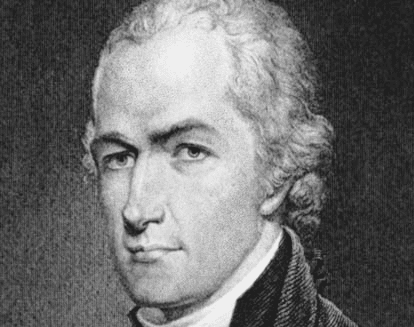We often hear people referred to as “Hamiltonians.” But that term always makes me wonder, which Hamilton do you mean?
I recently had the opportunity to speak to a class at the West Virginia University School of Law. The subject was the constitutionality of federal marijuana prohibition.
As I told the class, this is an open and shut case. It’s clearly unconstitutional. If you doubt me, ask yourself why alcohol prohibition required a constitutional amendment.
The simple fact is there is no delegated power for the feds to regulate marijuana within the borders of a state.
But over the years, federal courts have reinterpreted various clauses in the Constitution to “authorize” the federal government to do all kinds of things it was never intended to do. As Justice Clarence Thomas said in his dissent in the Raich medical marijuana case, if the federal government can regulate six plants in a woman’s back yard, the federal government has “no meaningful limits.”
And that’s where we are today – at least according to federal judges and politicians.
As the professor of the class I spoke to put it, this is the Hamiltonian legacy.
During the class, she divided the students up between “Hamiltonians and Madisonians” for a debate. I couldn’t help but interject and ask, “Which Hamilton are you talking about?”
During the ratifying debates, Hamilton was every bit as Madisonian and Madison. He sold the Constitution as a document that gave the federal government only a few limited powers just like all the other supporters of the document. In fact, I use quite a few Hamilton quotes in my book Constitution – Owner’s Manual to explain the limited scope of various constitutional clauses.
But once the Constitution was ratified, he did a complete 180. He became an apologist for a national, centralized government with sweeping federal power – a vision of government that the ratifying conventions would have resoundingly rejected. This is precisely why Hamilton had to make limited government arguments during ratification. It was the only way the Constitution would have ever been adopted.
Consider the general welfare clause. Opponents of the Constitution worried that this phrase would open the door for the federal government to wield almost unlimited power. But in Federalist #83, Hamilton argued that their worry was misplaced because the general welfare clause was strictly limited to the enumerated powers that followed and was not a grant of general authority.
“This specification of particulars [the 18 enumerated powers of Article I, Section 8] evidently excludes all pretension to a general legislative authority, because an affirmative grant of special powers would be absurd as well as useless if a general authority was intended.”
But just seven years after the Constitution was ratified, Hamilton reversed course and argued for an expansive reading of the clause in his Report on Manufactures.
The National Legislature has express authority “To lay and Collect taxes, duties, imposts and excises, to pay the debts and provide for the Common defence and general welfare” with no other qualifications than that “all duties, imposts and excises, shall be uniform throughout the United states, that no capitation or other direct tax shall be laid unless in proportion to numbers ascertained by a census or enumeration taken on the principles prescribed in the Constitution, and that “no tax or duty shall be laid on articles exported from any state.” These three qualifications excepted, the power to raise money is plenary, and indefinite; and the objects to which it may be appropriated are no less comprehensive, than the payment of the public debts and the providing for the common defence and “general Welfare.” The terms “general Welfare” were doubtless intended to signify more than was expressed or imported in those which Preceded; otherwise numerous exigencies incident to the affairs of a Nation would have been left without a provision. The phrase is as comprehensive as any that could have been used; because it was not fit that the constitutional authority of the Union, to appropriate its revenues shou’d have been restricted within narrower limits than the “General Welfare” and because this necessarily embraces a vast variety of particulars, which are susceptible neither of specification nor of definition.
It is therefore of necessity left to the discretion of the National Legislature, to pronounce, upon the objects, which concern the general Welfare, and for which under that description, an appropriation of money is requisite and proper.
According to post-ratification Hamilton, the term “general welfare” did imply a “general authority” after the pre-ratification Hamilton emphatically rejected this reading.
Hamilton made a similar flip-flop on the necessary and proper clause. In Federalist 33, He asserted that the necessary and proper clause (along with the supremacy clause) merely stated a truism and gave no additional power to the federal government.
It may be affirmed with perfect confidence that the constitutional operation of the intended government would be precisely the same, if these clauses were entirely obliterated, as if they were repeated in every article. They are only declaratory of a truth which would have resulted by necessary and unavoidable implication from the very act of constituting a federal government, and vesting it with certain specified powers. [Emphasis added]
Hamilton went on to explain that the act of delegating a power logically implies the authority to “pass all laws NECESSARY and PROPER for the execution of that power,” but it doesn’t authorize the exercise of any additional powers. Hamilton wrote, “If there is any thing exceptionable, it must be sought for in the specific powers upon which this general declaration is predicated. The declaration itself, though it may be chargeable with tautology or redundancy, is at least perfectly harmless.” [Emphasis added]
But again, Hamiton changed his tune just a few years later and claimed the necessary and proper clause gave Congress the authority to charter a national bank, a power nowhere delegated to Congress by the Constitution.
In fact, during the Philadelphia Convention, James Madison proposed a provision “to grant charters of incorporation where the interest of the U. S. might require & the legislative provisions of individual States may be incompetent.” It was voted down 8-3.
Without an explicit constitutional authorization to charter corporations, Hamilton turned to the “perfectly harmless” necessary and proper clause to justify his bank. He rested his argument on the existence of “implied powers,” writing, “It is not denied that there are implied well as express powers, and that the former are as effectually delegated as the latter.”
Of course, this very notion contradicts his ratification-era argument that Congress was limited to its enumerated powers. He went on to argue that Congress is authorized to create a corporation because this implied power is necessary and proper.
“It is conceded that implied powers are to be considered as delegated equally with express ones. Then it follows, that as a power of erecting a corporation may as well be implied as any other thing, it may as well be employed as an instrument or mean of carrying into execution any of the specified powers, as any other instrument or mean whatever. The only question must be in this, as in every other case, whether the mean to be employed or in this instance, the corporation to be erected, has a natural relation to any of the acknowledged objects or lawful ends of the government.”
Hamilton drove his point home insisting the word necessary doesn’t literally mean “necessary,” but can simply mean needful, requisite, or even just incidental, useful, or conducive.
By Hamilton’s definition, the word necessary becomes so expansive as to include virtually anything the government wants to do. This was precisely the construction the anti-federalists objected to during the ratification debates leading Hamilton to accuse them of “exaggerated colors of misrepresentation as the pernicious engines by which their local governments were to be destroyed and their liberties exterminated.”
These two examples demonstrate how Hamilton drastically shifted from the limited federal power perspective taken by all of the supporters of the Constitution during the ratification process to a nationalist pushing for virtually unlimited federal authority. He did a classic bait-and-switch. Hamilton was a duplicitous bastard (literally a bastard.) And we should give his post-ratification pontification about the Constitution no credence.
What he said during ratification – now that matters. Because it was on that basis that the people agreed to approve the Constitution. As Thomas Jefferson said, “On every question of construction let us carry ourselves back to the time when the Constitution was adopted, recollect the spirit manifested in the debates, and instead of trying what meaning may be squeezed out of the text, or intended against it, conform to the probable one in which it was passed.”
Reprinted from the Tenth Amendment Center.































